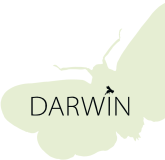
 |
Darwin Day 2012Big HistoryFred Spier historianEveryone who has told a good story knows how hard it is to decide where to start. Any segment of human history contains its own "prehistory" of factors and events which has consequences for our narrative. So where should history begin? With the ancient Greek? With the Neolithic? With evolution of Homo in Africa, or of mammals? Why not start with the only single beginning? Excluding for the moment other possible universes, everything goes back the ultimate start of it all: the Big Bang. Historians across the world joined forces in 2010 in the International Big History Association to promote the unified and interdisciplinary study and teaching of the history of Cosmos, Earth, Life, and Humanity. In doing so, they aim to explain how everything is connected in the past. However, the approach is also an arena to show how all academic disciplines are connected. The questions we raise for the Darwin Day in 2012 are therefore whether Big History is a good platform for understanding history and humanity, and for dialogue between the all too isolated faculties at the university. To introduce us to the field of Big History we have the pleasure to welcome Fred Spier. He is Senior Lecturer in Big History at the University of Amsterdam where he has organized and taught the annual 'Big History Course' since 1994.
Fred Spier Big History Today Lunch discussion in collaboration with Senter for vitskapsteori:
Dominican University in California is the first to aim for Big History to become a common theme for all its education, introducing first semester bachelor students to a course which draws on disciplines such as biology, sociology, anthropology, geology, economics, political science, astronomy, literature, and more. Is that also a path for UiB - or even for all education in Norway? More about Fred Spier Current activities include developing a paradigm that helps to explain all of history. In his article How Big History Works: Energy flows and the rise and demise of complexity (2005), downloadable on his personal website, the first outline of this theory was proposed. An improved and more elaborate version of this argument is presented in his book Big History and the Future of Humanity (Wiley-Blackwell 2010; The paperback version was released in January 2011. A translation in Spanish was published in 2011; a translation into Chinese by Truth & Wisdom Press is planned for August 2012; and also the contract for a translation into Arabic has been signed.)
Why is the Darwin Day celebrated? Who is behind the Darwin Day in Bergen? Darwin Day in Oslo Earlier events: 2011, 2010, 2009 (Darwin anniversary), 2008, 2007. |
|||||||||||
|
||||||||||||
